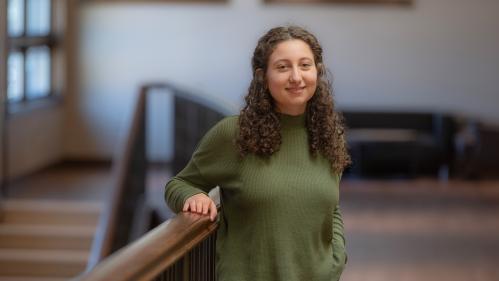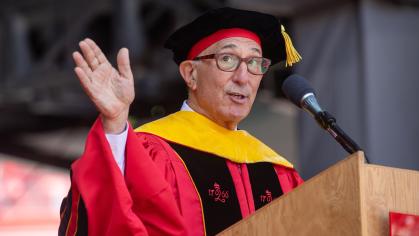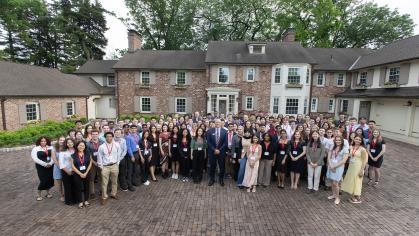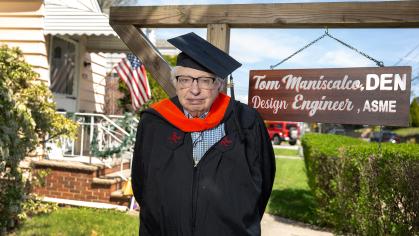Senior Works to Bring Communities Into the Digital Age While Preserving Her Own Ancient Roots

Abigail (Abi) Cohen, a senior at Rutgers University-New Brunswick, is working to increase access to reliable internet service for rural and low-income families.
Although the Garden State ranks in the top tier of states in terms of broadband internet accessibility, roughly 6 percent of New Jersey’s residents lack the essential amenity, the U.S. Census Bureau reports.
And that has broad economic and societal implications, says Cohen, a Marlboro resident who this month will receive double bachelor of arts degrees, one in computer science and one in environmental studies, from the honors program of the School of Arts and Sciences.
“Access to the internet represents access to information, education, public service announcements and other life-supporting resources,” she says. “Internet is so ubiquitous – and so expected of people – that not having it is a legitimate burden.”
Gathering information about school closings and weather, paying bills, learning about the candidates in local elections, finding a job – all these and more depend on the ability to connect online, Cohen notes.

Addressing the access gap is the focus of her Capstone Project, which all honors students are required to complete before commencement.
Cohen’s research hones in on community wireless networks (CWNs): local grassroots organizations designed to support an area’s internet infrastructure in place of mainstream (read: more costly) internet service providers.
CWNs generally require no annual contract or payments that bundle additional costs such as TV or phone services.
Cohen examined Philly Community Wireless, which serves several neighborhoods in North Philadelphia as a potential model for other venues, including municipalities in her home state.
Based on what she’s learned, Cohen is creating a website where users will be able to experiment with designing their own CWNs, whose effectiveness will depend on where and how high WIFI access points are placed in their neighborhoods.
It’s a work in progress, but when it’s fully operational she hopes the site will serve as a resource encouraging users to think beyond conventional ways to obtain internet service – and additionally to empower them to launch their own community organizing projects.
A 2021 graduate of Communications High School, a magnet public high school in Monmouth County, Cohen is focused on the digital future while also honoring her family’s ancient roots.
Cohen spent her gap year after high school in Israel, where she and her parents were born, studying biblical texts in Jerusalem as well as shepherding goats and harvesting vegetables at a farm in the northern part of the country.
During the three years it has taken to earn her twin degrees, she’s been active in Rutgers Hillel, the university’s Jewish students’ organization. Her duties involved co-chairing Koach, which serves members of the organization’s Conservative community.
The daughter of an Iraqi-Jewish mother and a Yemenite-Jewish father who passed along their love for Judaism and their families’ Sephardic customs and rituals, she finds joy in sharing these cherished parts of her heritage with other students.
Sephardi Jews are descendants of Jews who originated in Spain and Portugal, expelled by royal decree in the 15th century and dispersed to many nations. By contrast, Ashkenazi Jews -- who represent the majority of American Jews -- trace their origin to central and eastern Europe.
Although the two branches of Judaism share a common belief in the Torah and in monotheism, many of their customs and practices differ. This spring, Cohen organized Hillel’s first Sephardi-themed Shabbat to highlight her heritage.
With the foods of her childhood fragrant in her memory – kubaneh, a Sabbath bread from Yemen, and the roasted eggplant dish from Iraq known as babinjan -- she planned a menu and a program reflecting the nations where Sephardic Judaism has continued over the centuries.
More than 150 students and faculty members gathered at tables bearing materials describing Jewish life in such countries as Morocco, Portugal, Iran and Iraq.
“She printed educational information about the Middle Eastern countries that Sephardi Jews come from, and put it out on all the tables. She also helped plan a special menu reflecting the unique foods Sephardi Jews eat. It was a terrific event with an added educational impact to our weekly Shabbat celebration,” says Rabbi Esther Reed, chief experience officer at Hillel.
Cohen also worked with another student to redesign Hillel’s leadership structure based on research of other campus Hillel organizations.
The disparate strands of Cohen’s life coexist easily with her commitment to environmental research, which she hopes to follow as a career path after leaving Rutgers – and after a post-graduation trip to Australia and Thailand in June.
What the future will bring in terms of jobs may be unclear, but Cohen has no uncertainty about her overall goals.
“After I graduate, I hope to combine my degrees. One is passion, one is practical. I want to do something pro-environment, to support eco-friendly ways of living. I’m really interested in peoples’ relationships to the land, how what people are doing affects our earth,” she says.




